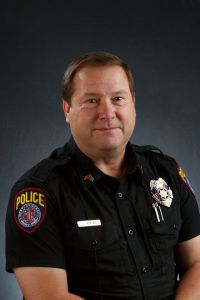Taking a proactive stance on safety

From a small task force of a few people to a full-blown operation with six emergency managers and 18 total staff members, Liberty University’s Emergency Management and Community Engagement (EMCE) department has grown significantly since its formation in 2021.
The department was created under President Emeritus Jerry Prevo, who saw the need for a proactive approach to emergency planning on campus.
Jeff Hurtak served as an officer in Miami and Gainesville, Florida, for years until his son decided to attend Liberty. Hurtak says that he and his family responded to God’s call and moved to Lynchburg, where he served as an officer for the Liberty University Police Department (LUPD) for 10 years. After that time, he was asked by Marcus Tinsley, vice president of security and public safety, and Ronald Sloan, associate vice president of security and public safety, to be the director of the new emergency management department.

Jeff Hurtak | Photo by Caroline Cummings
Hurtak and his small task force immediately jumped into action, beginning to build upon Liberty’s existing emergency action plans.
From his years of experience as an officer in Florida, Hurtak understood the depth of what goes into keeping a community safe, as well as the difference between his community in Florida and the community at Liberty.
“There are a lot of people (in EMCE) who love Liberty University,” Hurtak said. “They’re here for the community, not for themselves. I had never seen that kind of love and humbleness before.”
The tools that EMCE has implemented on Liberty’s campus range from proactive action plans for emergencies such as fires or bomb threats to offering emergency and safety training for students through the Active Assailant Community Preparedness, Flames Self Defense and Refuse to Be a Victim programs.
EMCE has also created and implemented full-scale emergency preparedness plans for large campus events. During these events such as football games, EMCE meets in their department operational center with other campus and community resources such as facility management, the Lynchburg Police Department, the Lynchburg Fire Department, transportation services and more. According to Hurtak, pooling so many resources into the same place at the same time means that if an emergency happens, everyone can respond at once.
Tinsley emphasized the importance of having an emergency management program.
“Emergency management is one of the most important — and largely overlooked — components of incident response,” Tinsley said. “Most don’t realize how necessary it is, until they’ve had the unfortunate experience of attempting to manage an incident
without it.”
Tinsley said that without an emergency management department, responding to large-scale problems on campus would become extremely hard.

Photo provided
“Any incident is pure chaos, and it’s important to have all aspects of the response, mitigation and recovery from that incident operate seamlessly,” Tinsley said. “This is where EMCE comes in. They coordinate, procure and handle all of the resources needed by the first responders, workers and incident commander to ensure that they have every tool and every resource that they need.”
As Hurtak’s team has continued to grow, his core goal for the department has remained the same.
“We want (the) kids safe on this campus, and we want to give (them) the tools for that,” Hurtak said. “I want to see the team continue to grow. I want the public to see Christ through our actions and what we do. I want the public to feel secure.”
For more information on EMCE, visit this website or download the new Champion Safe app.
Smith is the news editor for the Liberty Champion. Follow her on X

